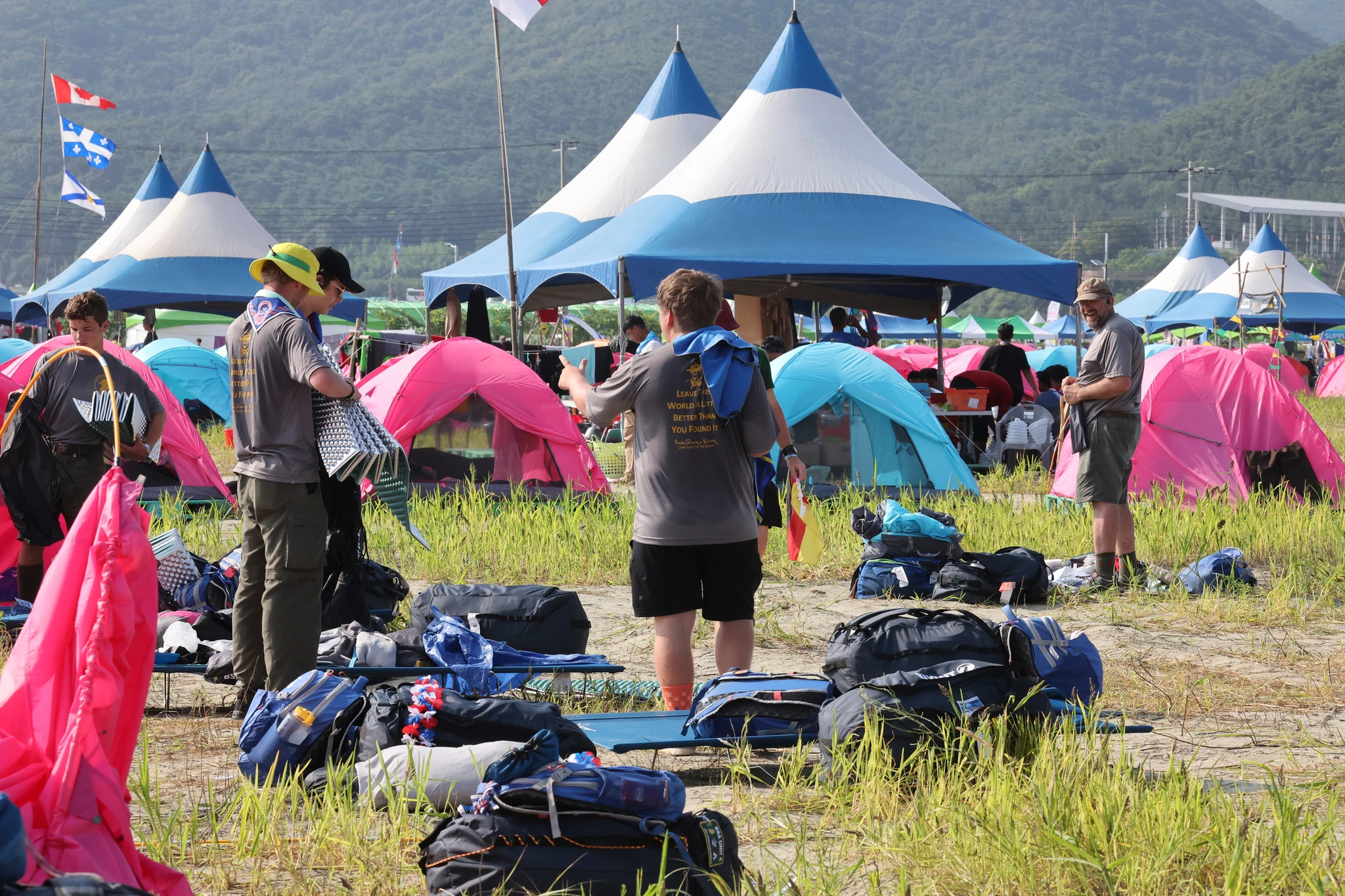Thousands of scouts at an international event in South Korea are being evacuated from a campsite due to an incoming typhoon.
Several countries including the UK had already left, blaming high temperatures and poor sanitary conditions at the camp.
UK Scouts chief executive Matt Hyde said he felt let down by organisers and UK activities had been set back years.
The site had become a health risk, he told the BBC.
Attended by more than 40,000 young people, the World Scout Jamboree has been plagued by problems from the very start.
Hundreds had fallen ill amid 35C (95F) heat, with scouts from the UK among those affected by heat exhaustion.
The British group of 4,500 people, the largest in attendance, arrived at the campsite in Saemangeum near the town of Buan last week but were transferred to hotels in the capital Seoul on Saturday.
Mr Hyde said the relocation would cost the UK Scout Association well over £1m from its reserves.
“We had commitments to those reserves that will of course mean that we can’t now do things that we wanted to do over the next three to five years,” he said.
The US and Singapore have also already pulled their teams from the campsite.
World Scout Jamboree organisers said on Monday that the South Korean government told them it was no longer safe to hold the event.
The government said it had listened to the concerns of the World Organisation for Scout Movements and national delegations, who had been requesting they close the site for days.
Some 36,000 people in Saemangeum will be taken by bus to areas which are not in the path of the typhoon, South Korea’s Vice Minister for Disaster and Safety Management, Kim Sung-Ho, has said.
The event “is still continuing,” but “the location is only changing because of the natural disaster,” he added.
Officials are seeking alternative venues and accommodation in and around Seoul.
The evacuation will begin on Tuesday at 10:00 local time (01:00 GMT).
Typhoon Khanun, which has already forced evacuations and cut off power to thousands in Japan, is forecast to reach South Korea’s southern Jeolla province on Thursday.
Heatwaves have become more frequent, more intense, and last longer because of human-induced climate change.
The impact of climate change on the frequency of storms is unclear but increased sea surface temperatures mean they are likely to be more intense and bring more extreme rainfall.
Coaches of British teenagers started arriving back in Seoul – around 120 miles (197km) from the campsite – on Saturday, where they will spend the next week in hotels.
Mr Hyde said the UK contingent was focused on running an “engaging programme” from the capital so “our young people still have amazing memories”.
He said the UK Scouts had raised repeated concerns about conditions at the site but while there were some improvements it was “too little too late”.
Conditions breached four red lines around a lack of shade, lack of food for those with dietary needs, poor sanitation and insufficient medical services, he added.
“We feel let down by the organisers because we repeatedly raised some of these concerns before we went, and during, and we were promised things were going to be put in place and they weren’t,” he said.
“If you can imagine [toilets] that are being used by thousands and thousands of people that are not being cleared with the regularity you would expect, you can imagine the sort of things that people were seeing.”
Planning of the event may have been affected by the Covid pandemic, Mr Hyde said, adding it was “critical” that an independent review was carried out.
The BBC has been told that some scouts are sharing five to a room, while up to 250 spent one night in the ballroom of one Seoul hotel due to a lack of available accommodation. All now have hotel rooms.
The jamboree, described as the world’s largest youth camp, gathers scouts from around the world every four years, each time in a different country.
Most of those attending are aged between 14 and 18, and 155 countries are represented in South Korea.
This is the first jamboree since the pandemic and was due to run until 12 August.
Source: BBC




















































